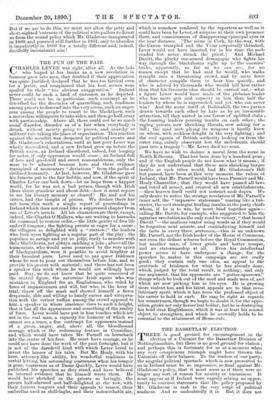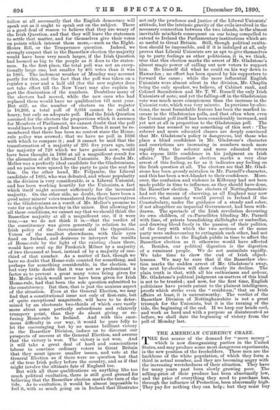THE BASSETLAW ELECTION. T HERE is good ground for encouragement in
the election of a Unionist for the Bassetlaw Division of Nottinghamshire, but there is no good ground for elation ; and perhaps this is fortunate for us at a moment when any very conspicuous triumph might have thrown the Unionists off their balance. To the leaders of our party,. the singular political spectacle which is now presented to us in Ireland must be so impressive, so final against Mr. Gladstone's policy, that it must seem as if there were no longer any sort of reason for anxiety or uneasiness. It must appear as if Ireland were eagerly seizing an oppor- tunity to convince statesmen that the policy proposed by Mr. Gladstone is rash to the very verge of political. madness. And so undoubtedly it is. But it does not follow at all necessarily that the English democracy will speak out as it ought to speak out on the subject. There is a good deal of reason to believe that they are weary of the Irish Question, and that they will leave the statesmen to settle that matter, and for themselves give their votes on points which interest them more,—such as the Eight- Hours Bill, or the Temperance question. Indeed, we strongly suspect that in the Bassetlaw election the majority would have been very much larger, if the Irish Question had loomed as big to the people as it does to the states- men. In the first place, the total poll was not an excep- tionally large one, but smaller by 405 votes than it was in 1885. The inclement weather of Monday may account partly for this, and the fact that the poll was taken on a register a year and a half old (for the new register does not take effect till the New Year) may also explain in part the diminution of the numbers. Doubtless many of the electors had moved, while the new ones who had replaced them would have no qualification till next year. But still, as the number of electors on the register is 10,268, a total poll of 8,034 cannot be called a heavy, but only an adequate poll. Had the Irish Question assumed for the electors the proportions which it assumes for Members of Parliament, we cannot doubt that the poll would have been a good deal heavier. Then it must be re- membered that there has been no contest since the Home- rule policy was avowed ; that we have no poll in 1886 with which to compare it ; and it cannot be said that the transformation of a majority of 295 five years ago, into the majority of 728 which we have gained now, would have been thought in 1886 at all a magnificent result for the alienation of all the Liberal Unionists. No doubt Mr. Mellor was a perfectly ideal candidate for the Gladstonians, and no pains were spared by the party to gain the seat for him. On the other hand, Mr. Foljambe, the Liberal candidate of 1885, who was defeated, and whose popularity in the division is very considerable, is a Liberal Unionist, and has been working heartily for the Unionists, a fact which itself might account sufficiently for the increased majority. On the other side, no doubt, there have been a good many miners' votes transferred from the Conservatives to the Gladstonians as a result of Mr. Mellor's promise to vote for an eight-hours day in the mines. But allowing for all these conditions, we cannot say that we should think the Bassetlaw majority at all a magnificent one, if it were true,—as we do not think it is,—that the verdict of the constituency was given generally in relation to the Irish policy of the Government and the Opposition. Voters of the smallest shrewdness, with their eyes fixed on Ireland, and desirous to interpret the results of Home-rule by the light of the existing chaos there, would have sent up Sir Frederick Milner by a majority of two thousand at least, instead of by a majority of one- third of that number. As a matter of fact, though we have no doubt that Home-rule counted for something, and perhaps for something considerable, in the election, we feel very little doubt that it was not so predominant a factor as to prevent a great many votes being given for Mr. Mellor which would never have been given for Irish Home-rule, had that been the sole question submitted to the constituency. But then, that is just the anxious aspect of the situation. Even at the General Election, we may find that a constitutional issue not only of first-rate, but of quite exceptional magnitude, will have to be deter- mined by an electorate two-thirds of which care vastly more about some perfectly subordinate and relatively trumpery point, than they do about giving or re- fusing Home-rule to Ireland. And with this enor- mous difficulty in our way, it would be pure folly to let the encouraging but by no means brilliant victory in the Bassetlaw Division, induce us to discount our prospects of success at the General Election, and assume that the victory is won. The victory is not won. And it will take a great deal of hard and conscientious labour to convince ordinary voters in Great Britain that they must ignore smaller issues, and vote at the General Election as if there were no question but that of the true Irish policy before the country, and as if that might involve the ultimate fate of England too. But with all these qualifications on anything like too much political exultation, there is still good ground for believing that the Bassetlaw election marks the turn of the tide. As to exultation, it would be almost impossible to feel it, with so much going on in Ireland that illustrates not only the prudence and justice of the Liberal Unionists' attitude, but the intrinsic gravity of the evils involved in the necessary connection between the two islands, in the almost inevitable mischiefs consequent on our being compelled to extend to Ireland the Parliamentary institutions which are so useful to Great Britain. Still, though political exulta- tion should be impossible, and if it is indulged at all, only proves that Liberal Unionists are as apt to give themselves up to party feelings as other politicians, it is, we think, true that this election marks the arrest of Mr. Gladstone's almost magic power of calling out new voters to support him. He himself did what he could on his way down to Hawarden ; no effort has been spared by his supporters to forward the cause ; while the more influential English Unionists were almost silent in the division, Mr. Chaplin being the only speaker, we believe, of Cabinet rank, and Colonel Saunderson and Mr. T. W. Russell the only Irish Unionists of note; and yet the falling-off in the Gladstonian vote was much more conspicuous than the increase in the Unionist vote, which was very minute. In previous by-elec- tions, the most formidable feature has been the marked in- crease in the Gladstonian polls, and that often when even the Unionist poll itself has been considerably increased, and yet not at all in proportion to the Gladstonian poll. The country has seemed to say something of this sort : The soberer and more educated classes are deeply convinced that Mr. Gladstone's policy is dangerous, but those who place a blind confidence in Mr. Gladstone's character and convictions are increasing in numbers much more rapidly than the soberer and more educated voters who repose little confidence in his judgment on Irish affairs.' The Bassetlaw election marks a very clear arrest of this feeling, so far as it indicates any feeling on the Irish question at all. The electors see that Mr. Glad- stone has been grossly mistaken in Mr. Parnell's character, and this has been a wet-blanket to their confidence. More- over, the confusion and violence in Kilkenny had not been made public in time to influence, as they should have done, the Bassetlaw election. The electors of Nottinghamshire had not the means of observing, as all England may now observe, what anarchy would prevail in Ireland if the Constabulary, under the guidance of a steady and sober, if not altogether an impartial Government, had been with- drawn. The spectacle of the Irish revolution devouring its own children, of ex-Parnellites blinding Mr. Parnell with lime, of priests brandishing shillelaghs or umbrellas, and drawing blood freely in the passion of their politics, of the fury with which the two sections of the same party were endeavouring to extinguish each other, had not been presented to the English public in time to affect the Bassetlaw election as it otherwise would have affected it. Besides, our political digestion is the digestion of a ruminant people. We do not assimilate rapidly. We take time to chew the cud of Irish object- lessons. We may be sure that if the Bassetlaw elec- tion marks the sudden arrest of Mr. Gladstone's sway, the next by-election will show clearly its decline. The plain truth is that, with all his enthusiasm and ardour, Mr. Gladstone's political judgment on matters of this kind is not to be trusted ; and now, for the first time, English politicians have proofs patent to the plainest intelligence, proofs which strike even the " residuum," that on Irish affairs at least, it is untrustworthy. The verdict of the Bassetlaw Division of Nottinghamshire is not a great triumph for the Unionists, but it is the turning of the tide, the beginning of the end. If we keep our heads coo], and work as hard and with a purpose as disinterested as before, we shall date the beginning of victory from the poll of Monday last.











































 Previous page
Previous page